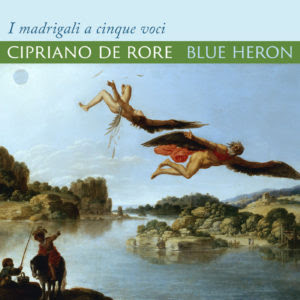Program: #20-33 Air Date: Aug 03, 2020
To listen to this show, you must first LOG IN. If you have already logged in, but you are still seeing this message, please SUBSCRIBE or UPGRADE your subscriber level today.
Scott Metcalfe of the superb Boston-based ensemble takes us through the remarkable first publication of madrigals by this Franco-Flemish composer who came to Italy.
|
NOTE: All of the music on this program is from a recording by the ensemble Blue Heron directed by our guest Scott Metcalfe. It is Blue Heron CD BHCD 1009. For more information on this group: http://www.blueheron.org
 The first release of new material from Blue Heron since winning the 2018 Gramophone Classical Music Award for Early Music, this two-disc set is the world-premiere recording of Cipriano de Rore’s landmark first book of madrigals for five voices. The set includes all twenty madrigals in De Rore’s 1542 print, as well as readings of the Italian poems (many of which are by Petrarch) by Alessandro Quarta. De Rore is celebrated as an innovator who helped create the madrigal as it is known today, putting the music at the service of the text and inventing a new, dramatic, and expressive harmonic language. In this music, listeners will perceive a deep engagement with the text, an engagement matched by the singers of Blue Heron, who were led by both Scott Metcalfe and Alessandro Quarta in developing an appropriately rhetorical style of performance. Musicologist Jessie Ann Owens (Professor emeritus, University of California, Davis) has shown that the book is a poetic and musical cycle that likely resulted from a collaboration between De Rore and the Venetian poet Giovanni Brevio (c. 1480-1560), who wrote the opening and closing poems of the set. The narrative structure is illustrated with “the colors of the modal system,” the madrigals being sequenced in modal order. Professor Owens’ research and conclusions are presented in extensive notes in the booklet.
Prof. Owens and Blue Heron won the 2015 Noah Greenberg Award from the American Musicological Society, which provided stimulus funding for the project. From Early Music Review: Blue Heron’s recordings of music from the Peterhouse Partbooks resulted in five compact discs which received acclaim and prizes, including the first and so far only instance of the Gramophone Early Music Award being made to an American vocal ensemble. It was therefore with a great sense of anticipation that their next major project, Cipriano de Rore’s complete book of madrigals in five parts, 1542, has been awaited. Unsurprisingly they deliver in spades, both in performance and in presentation, with a booklet including erudite but readable and informative essays by Jessie Ann Owens and Scott Metcalfe. Rore comes over as a natural composer of madrigals, and Blue Heron have the versatility to do his music ample justice. Perhaps sensitive to prospective purchasers contemplating the prospect of up to twenty madrigals in identical scoring being sung off the reel, Blue Heron preface each madrigal with the original texts, the majority by Petrarch, being read by Alessandro Quarta; suffice to say he declaims them as effectively as Blue Heron subsequently sing them. Rore’s 1542 collection was famously innovative, with its intense engagement between the music and the words unprecedented in secular vocal music, and it set the standard, including the use of five vocal parts, for the more serious type of madrigal till the seventeenth century. Basically his madrigals are a fusion of the Franco-Flemish polyphonic style which he himself exploited in his sacred music, with the lighter, airier, Italian style. Whereas some such fusions simply refuse to “fuse” in the wrong hands, Rore’s collection exhibits a high standard throughout. This makes it very hard to single out individual works to recommend. Thanks to the versatility and sensitivity of Blue Heron’s singers, and to Scott Metcalfe – the most stylish conductor that I can remember seeing (in Cambridge, 2016) – every work receives detailed individual attention. A work such as Quel sempre acerbo et honorato giorno could pass superficially as a Franco-Flemish motet, while Perseguendomi Amor al luogo usato comes across as what posterity would come to regard as typically madrigalian.
(For each madrigal there is a reading, followed by a musical track)
Disc 1
1-2 Cantai mentre ch’i’ arsi del mio foco (1:04, 4:08) 3-4 Hor che ’l ciel et la terra e ’l vento tace (1:09, 5:24) 5-6 Poggiand’al ciel coll’ali del desio (:59, 4:53) 7-8 Quand’io son tutto volto in quella parte (1:04, 5:32) 9-10 Solea lontana in sonno consolarme (:54, 5:36) 11-12 Altiero sasso lo cui gioco spira (1:08, 4:23) 13-14 Strane rupi, aspri monti, alte tremanti (1:02, 5:37) 15-16 La vita fuge, et non s’arresta una hora (:53, 5:24) 17-18 Tu piangi, e quella per chi fai tal pianto (1:05, 5:27)
Disc 2 3-4 Per mezz’i boschi inhospiti et selvaggi (1:03, 5:29) 5-6 Quanto più m’avicino al giorno extremo (:57, 5:58) 7-8 Perseguendomi Amor al luogo usato (:52, 5:42) 9-10 Chi vol veder quantunque pò natura (:57, 5:53) 11-12 Quel sempre acerbo et honorato giorno (1:08, 4:52) 13-14 Far potess’io vendetta di colei (1:00, 4:58) 15-16 Amor, che vedi ogni pensiero aperto (1:10, 5:49) 17-18 Ben si conviene a voi (:28, 2:52) 19-20 Hor che l’aria e la terra (:45, 3:43) 21-22 Da quei bei lumi ond’io sempre sospiro (:53, 3:44) |
Composer Info
Cipriano de Rore
CD Info
Blue Heron CD BHCD 1009